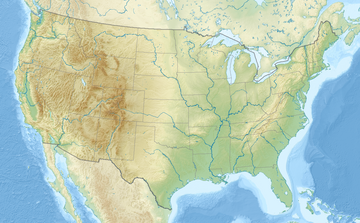
The Los Angeles Chargers are a professional American football team based in the Greater Los Angeles area. The Chargers compete in the National Football League (NFL) as a member club of the American Football Conference (AFC) West division. The team plays its home games at SoFi Stadium in Inglewood, California, which it shares with the Los Angeles Rams.
The 2002 NFL season was the 83rd regular season of the National Football League (NFL).
The 2001 NFL season was the 82nd regular season of the National Football League (NFL), and the first season of the 21st century. The league permanently moved the first week of the regular season to the weekend following Labor Day. In the wake of the September 11 attacks, the NFL's week 2 games were postponed and rescheduled to the weekend of January 6 and 7, 2002. To retain the full playoff format, all playoff games, including Super Bowl XXXVI, were rescheduled one week later. The New England Patriots won the Super Bowl, defeating the St. Louis Rams 20–17 at the Louisiana Superdome.
The 1997 NFL season was the 78th regular season of the National Football League (NFL). The Oilers relocated from Houston, Texas to Nashville, Tennessee. The newly renamed Tennessee Oilers played their home games during this season at the Liberty Bowl Memorial Stadium in Memphis, Tennessee while construction of a new stadium in Nashville started. Houston would rejoin the NFL with the expansion Texans in 2002.
The 1991 NFL season was the 72nd regular season of the National Football League (NFL). It was the final season for coach Chuck Noll. The season ended with Super Bowl XXVI when the Washington Redskins defeated the Buffalo Bills, 37–24, at the Metrodome in Minnesota. This was the second of four consecutive Super Bowl losses for Buffalo.

The 1987 NFL season was the 68th regular season of the National Football League (NFL). This season featured games predominantly played by replacement players, as the National Football League Players Association (NFLPA) players were on strike from weeks four to six with week three being cancelled in its entirety. This remains the last NFL season in which regular-season games were impacted by a labor conflict.
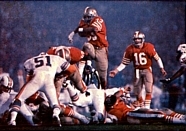
The 1984 NFL season was the 65th regular season of the National Football League. The Colts relocated from Baltimore, Maryland, to Indianapolis, Indiana, before the season.

The 1982 NFL season was the 63rd regular season of the National Football League. A 57-day-long players' strike reduced the 1982 season from a 16-game schedule per team to an abbreviated nine game schedule. Because of the shortened season, the NFL adopted a special 16-team playoff tournament; division standings were ignored for seeding. Eight teams from each conference were seeded 1–8 based on their regular season records. Two teams qualified for the playoffs despite losing records. The season ended with Super Bowl XVII when the Washington Redskins defeated the Miami Dolphins 27–17 at the Rose Bowl.

The 1981 NFL season was the 62nd regular season of the National Football League. The season ended with Super Bowl XVI when the San Francisco 49ers defeated the Cincinnati Bengals 26–21 at the Pontiac Silverdome in Michigan.
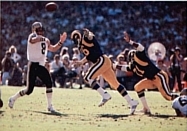
The 1980 NFL season was the 61st regular season of the National Football League.
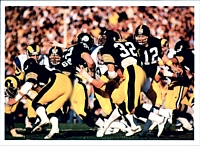
The 1979 NFL season was the 60th regular season of the National Football League. The season ended with Super Bowl XIV when the Pittsburgh Steelers repeated as champions by defeating the Los Angeles Rams 31–19 at the Rose Bowl. The Steelers became the first team to win back-to-back Super Bowls twice.

The 1978 NFL season was the 59th regular season of the National Football League. The league expanded the regular season from a 14-game schedule to 16 games, which it remained in place until 2021 when it was increased to 17 games. Furthermore, the playoff format was expanded from 8 teams to 10 teams by adding another wild card from each conference. The wild card teams played each other, with the winner advancing to the playoff round of eight teams.

The 1977 NFL season was the 58th regular season of the National Football League. The two second-year expansion teams switched conferences, with the Seattle Seahawks moving from the NFC West to the AFC West, and the Tampa Bay Buccaneers transferring from the AFC West to the NFC Central.
The 1976 NFL season was the 57th regular season of the National Football League. The league expanded to 28 teams with the addition of Seattle Seahawks and Tampa Bay Buccaneers. This fulfilled one of the conditions agreed to in 1966 for the 1970 AFL–NFL merger, which called for the league to expand to 28 teams by 1970 or soon thereafter.
The 1975 NFL season was the 56th regular season of the National Football League.

The 1973 NFL season was the 54th regular season of the National Football League. The season was highlighted by O. J. Simpson becoming the first player to rush for 2,000 yards in one season.
The 1972 NFL season was the 53rd regular season of the National Football League. The Miami Dolphins became the first NFL team to finish a championship season undefeated and untied when they beat the Washington Redskins in Super Bowl VII. The Dolphins not only led the NFL in points scored, while their defense led the league in fewest points allowed, the roster also featured two running backs who gained 1,000 rushing yards in the same season.
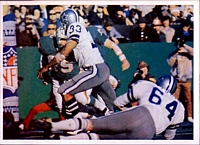
The 1971 NFL season was the 52nd regular season of the National Football League. The Boston Patriots changed their name to New England Patriots to widen their appeal to the entire New England region after moving to their new stadium in Foxborough, Massachusetts, located between Boston and Providence, Rhode Island.
The 1970 NFL season was the 51st regular season of the National Football League, and the first after the consummation of the AFL–NFL merger. The merged league realigned into two conferences: all ten of the American Football League (AFL) teams joined the Baltimore Colts, Cleveland Browns, and Pittsburgh Steelers to form the American Football Conference (AFC); the other thirteen NFL clubs formed the National Football Conference (NFC).
The 2017 NFL season was the 98th season in the history of the National Football League (NFL) and the 52nd of the Super Bowl era. The season began on September 7, 2017, with the Kansas City Chiefs defeating the defending Super Bowl LI champion New England Patriots in the NFL Kickoff Game. The season concluded with Super Bowl LII, in which the National Football Conference (NFC) champion Philadelphia Eagles defeated the American Football Conference (AFC) champion New England Patriots to win their first Super Bowl title, and fourth NFL championship, in franchise history, and making the NFC East the first and currently only division where every team has won a Super Bowl.
